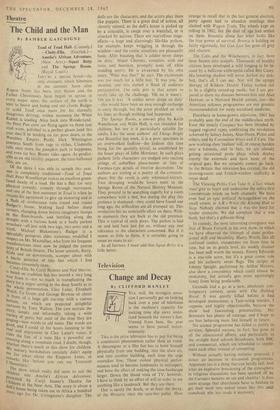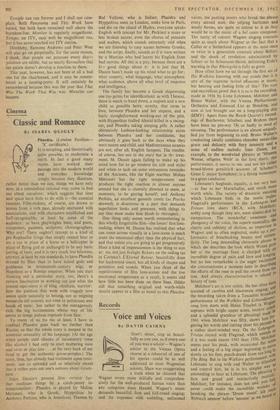Television
Change and Decay
Yrs, well, the strongest sensa- tion I personally get on looking back over a year of television is the medium's capacity for making time slip away unno- ticed beneath the viewer's feet. Viewed from here, the year seems to have passed instan- taneously. By CLIFFORD HANLEY This is the price television has to pay for being a continuous phenomenon rather than an event. A theatregoer or a film fan has to hoist himself physically from one building, into the alien air, and into another building, each time the urge overtakes him. These violent physical perfor- mances tend to become landmarks in retrospect, and have the effect of making the time-landscape larger. Down the bland vista of TV, however, I have to think by an effort of will in order to see anything like a landmark. But they are there.
One is surely the deaths or at least the decay, of the Western, once the sure-fire puller. How strange to recall that in the last general election, party agents bad to abandon meetings that clashed with Wagon Train. The wheels kept on rolling in 1962, but the dust of age had settled on them. Bonanza alone has what looks like the true power of survival. Bronco is holding on fairly vigorously, but Gun Law has gone all grey and obscure.
The Colts and the Winchesters, in fact, have been beaten into scalpels. Thousands of healthy citizens have developed a wild longing to be in- cised by a bellicose anthropoid called Ben Casey. His lowering .shadow will never darken nay sick- bed, that's all I can say. Nor will the syrupy therapy of Kildare. Doctor Finlay turned out to be a slightly mixed-up medic, but I am pre- pared to share my diseases between him and Alan Dawson; as a National Health patient, too—the American sickness programmes are our greatest recommendation for nasty socialised medicine.
Elsewhere in home-grown television, 1962 has probably seen the end of the middle-class myth. Even the treacly Compact has been invaded by rugged regional types, confirming the revolution achieved by Sidney James, Alun Owen, Pinter and others, and by Coronation Street and Z Cars. The new working-class 'realism' will, of course, harden into a formula, and in fact, we are already getting occasional prole plays which display merely the externals and have none of the original guts. But we certainly cannot go bask. In the Britain that television has created, the old drawing-room and French-window mullarky is stone dead.
The Viewing Public Can Take It. a' fact which must give us heart and undermine the safety-first commercials minds on both channels. We have even had an epic political Armageddon on the small screen, in AR's When the Kis.ving Had to Stop. Nobody claimed that it was too hard for tender stomachs. We did complain that it was bunk, but that's a different thing.
In comedy, the most interesting emergence was that of Bruce Forsyth in his own show, in which we have observed the triumph of sheer profes- sional skill and liteability. Harry Worth, like all confused comics, exasperates me from time to time, but on its gentle level, his weekly disaster has been well worth the money. Jimmy Edwards is a one-role actor, but it's a great comic role and his authority never flags. The scripts of Johnny Speight, performed by Arthur Haynes, also show a consistency which could almost be monotony, but actually gets more agonisingly funny from being predictable.
Granada had a go at a new, absolutely con- temporary comedy' series with The Bulldog Breed. It was quietly killed before it had developed momentum; a Tam-rating murder, I suppose, and highly objectionable, because the show had fascinating potentialities. Mr.' Bernstein has plenty of courage, and I hope to see him behaving more like himself in future.
No science programme has failed to justify its air-time. Splendid success, in fact, has gone to all the educational efforts, and particularly to the straight hard schools broadcasts, both BBC and commercial, which are scheduled to supple- ment each other instead of competing.
Without actually having statistics prepared, I detect an increase in discussion programmes. Argument too is a thing that can hardly fail. And what an explosive broadening of the atmosphere in religious discussions has been sparked off by the Carstairs lectures on sex and chastity! It does seem strange that churchmen have to hesitate to get their teeth into naked issues like this until somebody else has made it necessary. Tonight can run forever and I shall not com- plain. Both Panorama and This Week have varied, but both have remained well above the boredom-line. Monitor is regularly magnificent. Tempo, on ITV, may well be magnificent too, but it has never reached my ITV station.
Dimbleby, Eamonn Andrews and Peter West will also go on perpetually, for the same reason, I think, that people eat potatoes every day— potatoes are edible, but so nearly flavourless that the palate doesn't develop a reaction to them.
This year, however, has not been at all a bad one for the chairbound, and it may be remem- bered as a turning-point. It will certainly be remembered because this was the year that That Was The Week That Was was. Miracles can happen.































 Previous page
Previous page